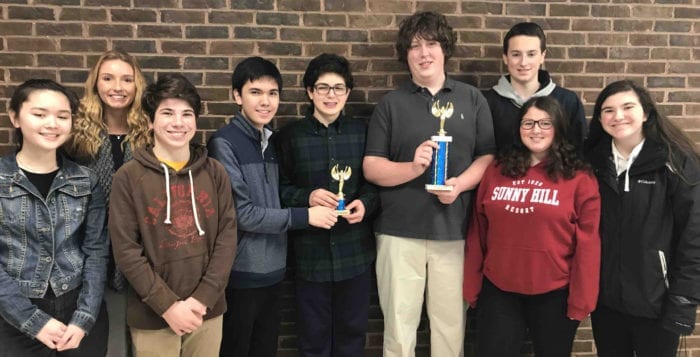SWR students prove they’re masters at debating
In just its first year, debate team members qualify for state competition

There’s no arguing that Shoreham-Wading River High School’s new, student-formed debate team is already a huge success. Just ask juniors Andrew Honold and Mahdi Rashidzada.
The two students, along with freshman Jalal Sawas, won the majority of their debates during a qualifying competition at Jericho High School Feb. 10 to advance to the New York State Forensic League championship tournament at Hofstra University in April.
“It was just kind of like throwing myself into cold water. It was really tense, but I could feel myself adapting better, and overall, it was really fun.”
— Andrew Honold
Among the roughly 20 teams represented within the league, Shoreham-Wading River will be one of only three school districts from Suffolk County.
“Going in, I was terrified — I didn’t know what to expect,” said Honold, who ended up in first place in the junior varsity division by winning all four of his debate sat Jericho, each on the topic of plea bargaining. “That was actually my first debate, too. It was just kind of like throwing myself into cold water. It was really tense, but I could feel myself adapting better, and overall, it was really fun.”
Rashidzada, who won three of four debates, said the club has been a great asset to him and his eight teammates.
“It gives us kids an outlet to really understand the world around us,” said Rashidzada, whose prior experience in debate outside of the district has helped steer the team. “It allows us to express ourselves and our views, to research and to improve our speaking skills. It’s just been a great experience and I’m really excited to be going to states this year with my friends.”
It was about a year ago, in March 2017, that two then-sophomores — club co-captains Declan Beran and Emma Kirkpatrick — proposed the idea of a debate team to the board of education. It was quickly and unanimously approved for the 2017-18 school year based on their presentation, where they outlined a plan for their first “pilot” year: They would assemble the team, hold weekly meetings with adviser and English teacher Brenna Gilroy, compete in practice debates and prepare for competition with other schools “by their senior year.” All but the last portion of their plan has been consistent, having gotten a head start on the competing part.
“I’m very happy and grateful that we were given the opportunity to work hard and achieve the goal of creating this team.”
— Declan Beran
“I’m very happy and grateful that we were given the opportunity to work hard and achieve the goal of creating this team,” said Beran, a lacrosse player and vice president of his class, who added he’s wanted to form a debate club since his freshman year. “Just seeing members of our team compete is really
special. It’s our first year and we’re going to states — it’s exciting. We encourage every grade level of our high school to get involved.”
Beran said the club typically meets two days a week and members review different points for each side of a topic, practice counterarguments, and in the week leading up to a debate, face off against each other. Based on that practice run, other students will evaluate their presentation and suggest ways to improve it. The students said they learn analytical and public-speaking skills, hone their speech-writing abilities and have a chance to regularly practice teamwork and collaboration.
In December, the team’s topic was on whether developing countries should provide developmental assistance to other developing countries. The teams get one to two months to fully research topics before debating. For the state competition, the students will research and discuss universal basic income, typically described as a new kind of welfare regime in which all citizens of a country receive a regular, livable and unconditional sum of money, from the government.
“That was something I knew absolutely nothing about,” Honold said. “And I’m still learning, but it’s a really interesting topic. It’s great to know about and debate, because it’s something that’s probably going to affect us in the future.”






